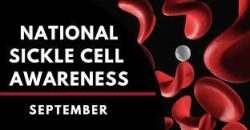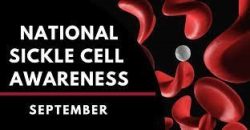Monthly archives: September 2023
September is Sickle Cell Awareness Month

Sickle cell disease symptoms
Symptoms of sickle cell disease come and go. Usually there are bouts (episodes) of symptoms but, in between episodes, patients do feel well.
Some of the complications include:
- Episodes of pain
These are also called a pain crisis or a vaso-occlusive crisis. They occur when sickle cells block small blood vessels in bones, which causes pain. Pain usually occurs in bones and joints. The pain can vary from mild to severe, and may come on suddenly. Early treatment is vital.
- Acute chest syndrome
This occurs when there are blocked blood vessels in the lungs and can sometimes occur with a lung infection. Acute chest syndrome is very serious. It is the number one cause of death in sickle cell. If suspected, please contact the haematology and critical care outreach team for urgent treatment.
- Infections
People with sickle cell disease are more prone to severe infections, particularly from certain types of bacteria, which can cause pneumonia, meningitis, septicaemia or bone infections. Symptoms of infection include fever, feeling generally ill, and pain in the affected part of the body.
- Priapism
Priapism is a painful erection that occurs without stimulation, sexual desire or arousal.
If the episode of priapism does not settle in one hour patients are advised to go to the nearest ED (emergency department) or the SCAT centre as soon as possible.
Be sure to also check out this short video featuring
Amanda Tembedza, Lead Sickle Cell and Thalassemia Nurse with the unit based at City Hospital explaining what sickle cell is and the symptoms of the disease.
Having issues with the Loop App?

Are you having trouble with the Loop App? Struggling to book annual leave or see your roster? If so, you can now contact the dedicated Loop helpdesk on 0121 507 3033. Lines are open Monday – Friday, 9am – 3pm.
Be sure to also check out this video on how to download and access the Loop application on your smartphone device.
Alternatively, you can email swbh.allocatequeries-helpdesk@nhs.net.
Don’t forget there are user guides and videos on the Loop Connect pages for further support.
New neonatal psychology programme available for staff
A new first-of-its-kind e-learning programme on neonatal psychology has been developed to support better outcomes for babies, families, and staff.
Psychologically-informed care takes into account the needs of everyone in the unit and considers how best to support them for better outcomes. For families, this can include managing better while on the unit and being well post-discharge. For staff, psychologically informed care sustains us too.
Developed by NHS England, the Association of Clinical Psychologists, and neonatal networks, this e-learning has been developed to encourage the workforce to think more psychologically – a key area highlighted by patients, advisory groups, and the Ockenden report, the Kirkup report and aligns with the new three-year plan for joint working across maternity and neonatal settings. No other training like this currently exists for neonatal staff.
Each of the four modules in the programme takes approximately 30 minutes to complete and cover the following topics:
- Psychologically-informed neonatal care
- Infant wellbeing on the neonatal unit
- Family wellbeing on the neonatal unit
- Staff wellbeing on the neonatal unit
Once completed learners will know more about psychologically informed care and have ideas about the ways they can implement this into their daily work. They will also have a better sense of the impact of the work on themselves and what can help them to manage.
For more information and to access the modules, please visit the Neonatal Psychology programme page.
Fraud Awareness Week : 12 – 18 November
International Fraud Awareness Week will take place this year from 12-18 November.
The overall aim is to help colleagues identify fraud and bribery risks against the organisation and in their personal lives and increase awareness of the reporting routes available.
Remote training sessions:
As with previous years, we will be hosting several training sessions remotely via Microsoft Teams during the week. To access all the training dates and times, please see Fraud Awareness Week training sessions.
Enough campaign: No one should live in fear of abuse
Abuse takes many forms – it can be emotional, physical, sexual or financial. It can be words or actions. At home or in the street. It can be inflicted by a partner, ex-partner, family member, colleague, friend or stranger. It can be in person, through technology and online.
Whatever form it takes, abuse is never justified. Any behaviour that demeans, frightens or distresses is abuse. It has to stop. Knowing what abuse is helps us all recognise it when it happens. We can all do something to keep each other safe. Click here to find out more about the Enough campaign and how you can intervene safely.
Note: If you think somebody is in immediate danger, always call 999.
Shuttle bus running reduced service this week

The shuttle bus will be running a reduced service for the rest of this week.
The shuttle will still be running at the same times but one of the shuttles will only be a nine-seater meaning there will be reduced seating.
Any colleague who needs to access the service during this period will need to plan for delays when travelling.
Please see Shuttle bus timetable for details regarding arrivals and departures.
Are you wearing your seatbelt: It has recently been reported that some colleagues have not been wearing their seatbelts when using the shuttle service. Seatbelts are designed to retain people in their seats, and so prevent or reduce injuries if ever a vehicle is in a collision. They ensure that as little contact is made between the occupant and vehicle interior as possible and significantly reduce the risk injury which is why it is vital all colleagues wear their seatbelt. Staff who refuse to wear their seatbelt will be asked to leave the vehicle.
September is Sickle Cell Awareness Month

The Sickle Cell and Thalassaemia unit (known as SCaT) is a day-case treatment centre providing care for patients with Sickle Cell Disease and Thalassaemia. Some appointments are booked; but we are largely a walk-in service.
The SCaT centre is a regional service providing:
- Day case pain management for sickle cell patients in acute sickle cell crisis.
- Some blood transfusions for sickle cell and thalassaemia patients.
- Outreach support for all our patients when they are in-patients.
- Medical and Nurse-led clinics
- Apheresis in conjunction with the National Blood Transfusion Service
- Joint endocrine, renal and orthopaedic clinics
Sickle cell disease (SCD) is a serious, inherited condition affecting the blood and various organs in the body. It affects the red blood cells, causing episodes of ‘sickling’, which produce episodes of pain and other symptoms. In between episodes of sickling, people with SCD are normally well. Long-term complications can occur. Good treatment, started early in life, can prevent complications. So, early diagnosis and specialist treatment are advised for SCD.
In the UK, about 15000 people have SCD. It is more common in people whose family origins are African, African-Caribbean or (less commonly in the UK) Asian or Mediterranean.
Birmingham has the highest concentration of patients living with sickle cell outside of London. Across Sandwell and Birmingham we care for over 600 patients living with sickle cell disease and a further 200 patients across the West Midlands region.
Have you entered the welearn QI Poster Contest?


We have launched our welearn quality improvement poster contest. This is now firmly established as an annual event and forms part of our welearn programme of learning and knowledge sharing across our organisation. The welearn QI poster contest aims to share good practice, quality initiatives, innovations, research and partnerships that have resulted in improvements for our patients, carers and colleagues. There is a prize of £5,000 for the winner, and £250 each for the two highly commended posters and popular staff vote – so definitely worth taking part.
Entries are encouraged and welcomed from everyone, whether you work with patients or provide non-clinical support. We are looking to see improvement projects and programmes written up and captured in a poster. Don’t be put off by this because help is available. Medical Illustration will provide support to design and produce the poster and you can discuss your ideas on content with the library and knowledge services team.
Visit the Connect pages for the guidance document, the poster template and also listen to the previous year’s winners about their experience of the process and how quality improvement brought about a positive impact on their services and patients.
Closing date for the poster contest is Friday 17 November.
If you need help with your submission or designing your poster, contact the library team and medical illustration team by emailing swbh.welearnposters@nhs.net.
Have you met our green fingered friend Sir Lawnsalot?

You may have noticed our new gardener made from recyclable materials outside Hallam Restaurant garden over the past few of week’s courtesy of EQUANS.
After reaching out to Trust colleagues across SWB, we are proud to announce their official name – Sir Lawnsalot!
This perfectly chosen name was suggested by Lisa Carswell, Community Phlebotomist.
Thank you to everyone who suggested a name for our new green fingered friend and be sure to be on lookout for the special plaque which will be placed alongside them soon.
New session promotes health benefits of aquatics and swimming
NHS England e-learning for healthcare has developed a new programme on the unique health benefits of aquatics and swimming.
The resource, made in partnership with Swim England, Aquatic Therapy Association of Chartered Physiotherapists (ATACP), and the University of Nottingham, has been created following research that highlights how healthcare professionals intuitively believe swimming and aquatic activity provide unique health and wellbeing benefits, ideal for musculoskeletal conditions, chronic pain and weight problems, but they lack the knowledge and skills to make this a more routine conversation with patients.
To address this issue, the 20-minute session raises awareness of the benefits of aquatic activity on health and wellbeing and will enhance learners’ confidence in identifying patients who would benefit most.
It covers the following topics:
- Helping people navigate their way to swimming and aquatic activity
- What happens to the body in water?
- Adaptive effects of aquatic exercise
- Who can exercise in water?
- Exploring aquatic activities
It is aimed at GPs, physiotherapists, and those who influence an individual’s decision to be active, such as social prescribers and leisure professionals.
For more information and to access the programme, please visit the Aquatics and Swimming programme page.
← Older items Newer items →